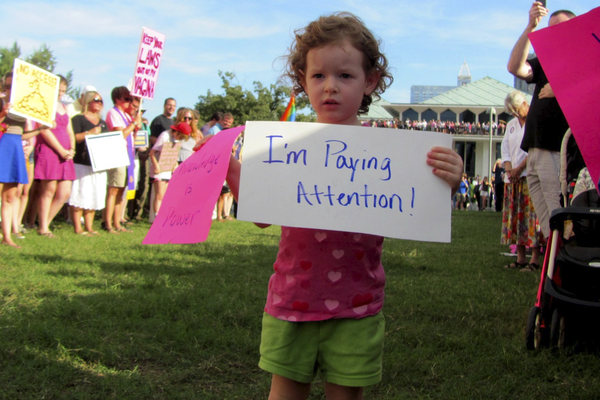What to do about COVID? Start by Listening to People

Moral Monday, Raleigh, North Carolina, 2013. Photo twbuckner. CC BY 2.0
Today I donated groceries at Carrboro’s town hall. In the parking lot, a masked volunteer took the food out of my trunk, thanked me, and I drove off. All around the country, others are doing the same, because so many more of our neighbors suddenly face hunger.
As I drove away, I thought about an oral history interview I did with Ilana Dubester, an advocate for North Carolina’s Latinx community. She started helping immigrants get necessities like food, but over time realized she didn’t want to “give people fish or teach them to fish,” but rather to clean up “the toxic pond” – the structural issues that warped their lives. The voices I’ve heard as an oral historian float in my head, framing the way I react to the health and economic disaster wrought by the coronavirus. None of us should ignore the wisdom held by those who are suffering most.
Right now it’s all hands on deck to save lives, sustain our local businesses, and stem the devastation. But soon we need to start fixing the structural problems in our politics, healthcare, education, and economy that exposed us to this terrifying disease and led to the damage it is wreaking. How? In part, by listening to people.
I have been leading a research project called Stories to Save Lives: Health, Illness and Medical Care in the South, and in our interviews here in North Carolina, I have been struck by profound examples of benevolence: One woman in Stanly county described how her son has needed over forty surgeries; the local college put on two plays, the elementary school held a penny drive, and the fire department hosted a hamburger dinner to raise funds for the healthcare she couldn’t afford otherwise. A man in Orange county continued delivering food to isolated senior citizens despite his terrible back pain because he didn’t want them to go hungry. A woman in rural Warren county started a restaurant, where the profits paid for transportation so that residents could access doctors.
What these stories tell me is that there is a deep and beautiful streak of generosity in our communities; we believe in caring for each other, our families and our neighbors, a strength we will continue to need and rely on. Our interviews show people’s resilience, and their creativity in the face of pain and suffering.
But they also reveal real weaknesses in the fabric of our society that many of us ignored for too long. Even before this pandemic, as a people we were stretched thin. Too many were depending on charity and on care and support from individuals who themselves were on the edge, instead of on strong institutions or well-designed systems that could better weather a crisis. That restaurant? It closed last year.
Over the last few years, we asked people what they would do to fix the health challenges facing their communities. Many sought more investments in rural infrastructure, including broadband. Some focused on the need to expand Medicaid. Others yearned for a medical system that put people ahead of profits. Experts and policy makers would do well to spend some time hearing these stories. With the pandemic laying bare the realities our interviewees warned us about, we’re going to need their insights to move forward.
As Ilana Dubester explained, “We swim in the same pond, and so if the pond is toxic for me, your corner of the pond is never going to be clean.” Perhaps nothing makes this so clear as a pandemic. It’s time we start listening to what people have been trying to tell us for a long time.